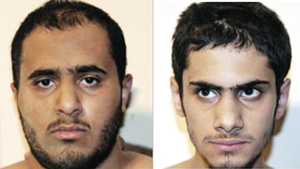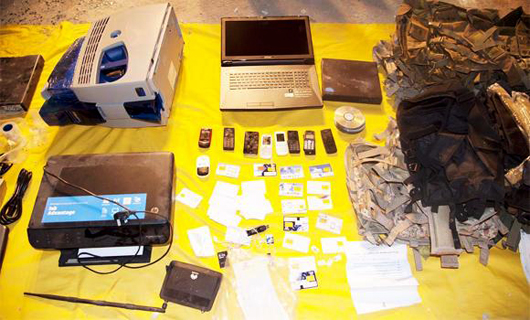Jeddah, Sep 17: Security agencies have arrested two terror suspects and are on the hunt for two others, according to the Interior Ministry on Wednesday.
The two have been identified as Ahmed Said Jabir Al-Zahrani, 21, and Mohammed Said Jabir Al-Zahrani, 19, who were arrested at their hide-out in Riyadh, said Maj. Gen. Mansour Al-Turki, spokesman of the Interior Ministry.
Al-Turki said security officers, acting on reports of suspicious activity and that the men had weapons in their possession, cordoned off a house in Monasiyah district on Tuesday. A gunbattle ensued, with the suspects also throwing a grenade at the officers. They were eventually overpowered and arrested, he said.
At the house, the officers seized cash of SR402,101 and $5,500, three machine guns, 36 bullet magazine holders, 2,848 rounds of machine gun ammunition, three handguns, 10 handgun magazines, five grenades, one car plate, and mobile phones and laptops.
The police also found a printer to forge identity cards with one packaging device, several identity cards that may be forged, a scanner, surveillance cameras, hand-drawn maps of targeted sites, and military backpacks to carry ammunition.
Meanwhile, the hunt is on for two other men who fled from a holiday resort in Darma Province, about 60 km west of Riyadh. Al-Turki said that officers had launched an operation at the resort after receiving reports that two men were acting suspiciously and had weapons in their possession.
When the men realized that they were going to be arrested, they tried to flee in a car with false Omani plates. However, officers opened fire and managed to stop the car. The suspects then forced a citizen out of his car and managed to get away.

The police officers had not been able to stop the two by opening fire on them because they feared for the safety of passersby. However, a major operation has been launched to find them, said Al-Turki.
At the resort, the police found a belt with explosives attached, a stolen car, and a makeshift laboratory to manufacture explosives, said Al-Turki.
He said the country’s security agencies would continue to launch operations to find and arrest terrorists and those supporting them. There would be heavy penalties for violators, he said.






Comments
Add new comment